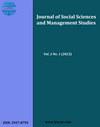桑给巴尔教育利益相关者对引进对外汉语的看法调查——以彭巴Mkoani地区为例
引用次数: 0
摘要
本文旨在探讨教育利益相关者对在桑给巴尔引进汉语的看法、面临的挑战及其对桑给巴尔文化的影响。这项研究采用了定性和定量两种方法。数据收集采用问卷调查、焦点小组谈话和访谈等方法。共有62名受访者参与了这项研究,其中包括20名学生、34名教师、6名班主任和2名教育官员。本研究采用分层抽样和目的抽样的方法来选择样本。对教师、班主任、教官采用目的抽样,对学生采用分层抽样。与校长和教育主任进行访谈,并分别向学生和教师进行焦点小组讨论和问卷调查。通过问卷收集的数据使用SPSS软件(version 20)进行解释;而通过访谈和焦点小组讨论收集的信息进行了定性分析。调查结果很明确,约92.78%的受访者接受在桑给巴尔的中学引入汉语作为外语的想法。同时,研究结果表明,汉语的序言将面临许多挑战,如缺乏称职的汉语学科教师,教育资金短缺,采用传统的教学方式,最后的研究表明,外语的引入对桑给巴尔文化的负面影响很小,同时论文提到语言素养与文化之间存在很大的关系。研究建议在桑给巴尔的中学可以引入汉语作为一门外语,但要采用超现代的教学方式;要想取得更好的成绩,必须对频繁培训的语文教师和不愉快的语文教学环境表示钦佩。关键词:利益相关者;教育利益相关者;外语本文章由计算机程序翻译,如有差异,请以英文原文为准。
Investigating the Perceptions of Educational Stakeholders on the Introduction of Chinese as a foreign language in Zanzibar .Taking Mkoani District of Pemba as an Example
This paper aimed at probing the perception of education stakeholders on the introduction of the Chinese language in Zanzibar, the challenges, and its effects on Zanzibar culture. The study employed both qualitative and quantitative approaches. Questionnaires, focus group conversation, and interviews were used in data collection. A sample of 62 repliers was involved in the study including 20 students, 34 teachers, 6 head teachers, and 2 educational officers. The study employed stratified sampling and purposive sampling techniques in opting the samples. Purposive sampling was used to select the teachers, head teachers, and the educational officer while stratified sampling was used to sample the students. Interviews were conducted with head teachers and educational officers whereas focus group discussions and questionnaires were taken to students and teachers respectively. The data collected through the questionnaires were interpreted using software (SPSS) version 20; while information collected using interviews as well as focus group discussion was analyzed qualitatively.
The results were unambiguous as about 92.78% of respondents accepted the idea of introducing Chinese as a foreign language at secondary schools in Zanzibar. Meanwhile, the findings showed that the preface of the Chinese language would be faced with a myriad of challenges similar as a deficit of competent Chinese subject teachers, deficit of educational coffers, employing traditional style of tutoring and the final study revealed that the introduction of foreign language has little negative effects on the Zanzibar culture, in the meantime paper mentioned that the language literacy and culture has a great relation between. The study recommended that Chinese as a foreign language can be introduced at secondary schools in Zanzibar but the use of ultramodern tutoring style ; frequent training of Chinese subject teachers and teaching Chinese subjects unhappy environment must be admired for better performance.
Keywords: Stakeholders, Educational Stakeholders, Foreign Language, Chinese Language
求助全文
通过发布文献求助,成功后即可免费获取论文全文。
去求助
来源期刊

Journal of Social Sciences and Management Studies
Social Sciences and Management Studies-
自引率
0.00%
发文量
0
期刊介绍:
Journal of Social Sciences and Management Studies (ISSN: 2957-8795) is a peer reviewed journal focuses on integrating theory, research and practice in the area of management and social sciences. The journal discusses the distinctive disciplinary practices within the sciences of the management and social field and examines examples of these practices. In order to define and exemplify disciplinarity, the journal fosters dialogue ranging from the broad and speculative to the microcosmic and empirical. In considering the varied interdisciplinary, trans-disciplinary or multidisciplinary work across and between the social, natural and applied sciences, the journal showcases interdisciplinary practices in action. The focus of papers ranges from the finely grained and empirical, to wide-ranging multi-disciplinary and transdisciplinary practices, to perspectives on knowledge and method.
 求助内容:
求助内容: 应助结果提醒方式:
应助结果提醒方式:


